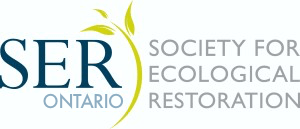Congratulations to the SERO Scholarship Award Winners:
- 2019 – Hashveenah Manoharan
- 2018 – Charlotte Montgonmery
- 2017 – Anne Munier
- 2016 – William Twardek
- 2015 – Hilary Lefort
- 2014 – Brock Trojahn
- 2013 – Jennifer Gordon
- 2012 – Michelle Burger
- 2011 – Emily Grubb
- 2010 – Kaileyann Chretien
- 2008 – Mary Ann Young
- 2007 – Dema Ali
- 2006 – Tiffany Brule and Heather Kime
Philosophy & Description
SER Ontario is part of an international organization committed to the ecologically sensitive repair and management of ecosystems. While the focus of our efforts is the Ontario region, we strive to share ideas and initiatives across borders and around the globe. The SER Ontario mission is to promote the practice of ecological restoration and provide educational opportunities and materials for members and for the community at large. We, in collaboration with the central SER body, are committed to the development of ecological restoration as a science, art and conservation strategy.
SER Ontario currently includes members with a wide range of backgrounds and interests who all share an active interest in ecological restoration. Our membership includes ecologists, educators, NGOs, writers, gardeners, designers, environmental consultants, native plant growers, arborists & foresters, scientists & researchers, natural resource managers and many others who have simply cultivated an interest in ecological restoration.
SER Ontario annually offers one annual scholarship for a student whose studies focus on applied, natural and/or social aspects of ecological restoration. This scholarship is currently valued at $1,000 and is non-renewable. The scholarship is open to students enrolled in Ontario community colleges and undergraduate students at Ontario universities. Applicants will be adjudicated based on the quality of their application, not the type of post-secondary institution.
Scholarship Objectives
The objectives of the SER Ontario scholarship program are to:
- Support the emergence of critical research in the field of ecological restoration;
- Sponsor students actively engaged in scholarly themes related to ecological restoration; and
- Promote the broad ideals of ecological restoration through increased membership within SER Ontario and dissemination of scholarship winner profiles.
2019 Scholarship Profile – Hashveenah Manoharan
- Hashveenah sits on Friends of the Rouge Watershed’s Board of Directors and assist in coordinating their restoration work during planting seasons, and trains high school apprentices. She has been a Nature Interpreter for the High Park Nature Center (2016), an Education Assistant at the Toronto Botanical Gardens (2017), and a Site Animator at the Evergreen Brickworks (2018). She is also an active member of the UW Society for Ecological Restoration Chapter
- An advocate for community engagement in ecological restoration and strives towards eliminating social barriers that restrict nature connectedness in low-income neighbourhoods.
- Hashveenah wants to increase the exposure of youth, women-of-colour and visible minorities to the field of ecological restoration
- Wishes to continue to practice restoration by finishing her undergraduate degree and complete the Ecosystem Restoration program at Niagara College prior to an eventual Master’s Degree.
2018 Scholarship Profile – Charlotte Montgonmery
Environment, Resources and Sustainability (honours, co-op) completed year 3 of 5
- Stewardship Youth Ranger with the Ontario Ministry of Natural Resources and Forestry
- Worked alongside Ontario Streams to help administer the Adopt-A-Stream program
- Particularly interested in applying ecological restoration on Indigenous lands, and how the integration of traditional knowledge into management practices can help meet restoration goals.
- Charlotte hopes to obtain either a Master’s degree in Environmental Studies in Northern Communities through the University of Lakehead or a Master’s of Indigenous studies from Trent University.
- Currently attending the Haida Gwaii Higher Education Society, studying Social-Ecological Systems. Courses include: Social-Ecological Change: An Introduction to Systems Thinking and Resilience, Environmental Assessment in Cross-Cultural and Indigenous Contexts, Plant Ecology and Diversity, and Ethnoecology/ethnobotany.


